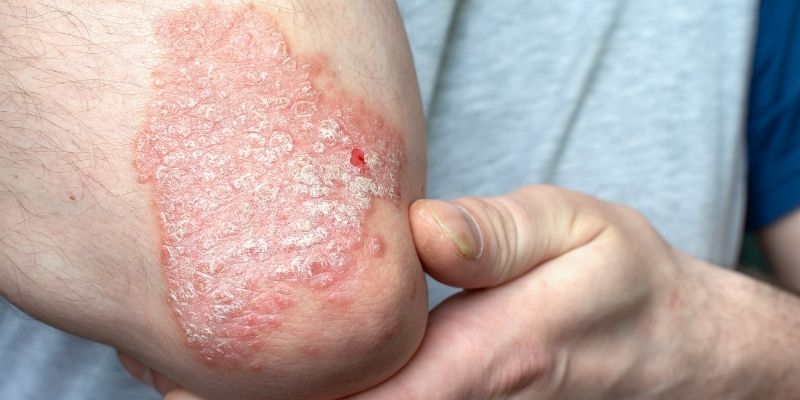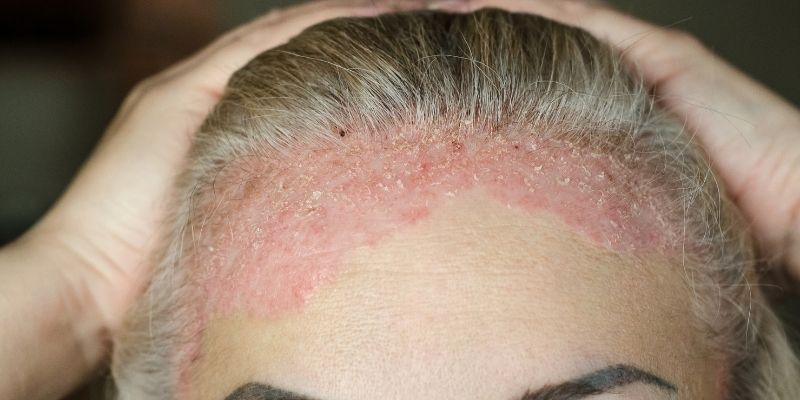Millions of individuals have chronic autoimmune psoriasis. The fast proliferation of skin cells causes thick, red, scaly areas anywhere on the body. These patches are unattractive and painful but are caused by an immunological response that produces inflammation and skin cell turnover. Thus, psoriasis patients commonly have flaking skin, which causes pain and mental and psychological issues. To manage psoriasis and improve skin health, you must understand why these patches occur and how to remove scales properly. This page discusses psoriasis patches, scaling removal procedures, advantages, and concerns.
Chronic autoimmune psoriasis accelerates growth by misidentifying healthy skin cells as invaders. Normal skin cells renew every 2830 days, whereas psoriasis patients need just a few days. Rapid skin cell turnover accumulates immature cells on the skin's surface, forming red, inflammatory plaques with silvery-white scales that readily peel off. This excessive cell growth may cause itching and pain.
Genetics, environment, and immune system malfunction may cause psoriasis. Many causes may cause it, including stress, infections, skin traumas, drugs, smoking, and frequent drinking. Obesity and metabolic syndrome may worsen psoriasis. The dead skin cells produce thick, scaly patches that irritate the surrounding skin and raise the risk of subsequent infections. Remove these scales to relieve symptoms, improve topical therapy penetration, and improve skin look, increasing self-esteem and quality of life. Psoriasis care requires safe scale removal.

Exfoliating acids like AHAs and BHAs may help cure psoriasis by softening and breaking down scales. AHAs like glycollic acid remove dead skin cells, promote cell turnover, and keep skin smooth. But BHAs like salicylic acid dissolve oil and dirt more profoundly in the pores, which may thicken psoriasis plaques. These acids minimize plaque severity and enhance skin texture when used frequently.
Starting with fewer acids may prevent irritation, particularly for sensitive skin. Gradually rising concentration as skin tolerance rises is responsible. A psoriasis care plan that includes exfoliating acids may relieve symptoms and improve skin.
Warm, therapeutic baths soothe and remove scales from psoriasis. Warm Epsom, oatmeal, or Dead Sea salt baths hydrate and reduce inflammation. Soaking for 1520 minutes softens plaques, making scale removal easier. This practice helps psoriasis patients relax and relieve pain.
After showering, moisturize quickly to maintain hydration and skin barrier. Try a thick moisturizer or ointment to avoid dryness and psoriasis flare-ups after soaking. Regular baths can improve skin health and psoriasis comfort.
Keratolytic shampoos with salicylic acid or coal tar help scalp psoriasis. Coal tar reduces scaling and irritation, while salicylic acid softens scalp scales. When used properly, these shampoos may treat symptoms and maintain a healthy scalp. For best results, follow the shampoo directions and let it remain on the scalp for the specified period before washing.
Keep the scalp clean and avoid psoriasis scales using keratolytic shampoos. These specialized solutions help manage scalp psoriasis symptoms and improve scalp health, giving much-needed comfort to people plagued by this chronic illness.
Natural oils like coconut, olive, and tea tree oil may moisturize and release scales for scalp psoriasis. Dry scalp regions are hydrated using these oils directly, making scale removal more straightforward. Coconut oil contains anti-inflammatory qualities that soothe and cure inflamed skin. Leave the oil on for a few hours or overnight before shampooing for optimal absorption and efficiency.
Use oils to treat symptoms and feed the scalp to improve hair health and appearance. Using natural oils to treat psoriasis may increase scalp comfort and reduce flaking, enhancing quality of life.
Coal tar has been used for decades to treat psoriasis and reduce scaling, itching, and inflammation. Slowing psoriasis' fast cell cycle helps break down thick plaques and improve the skin's look. Applying coal tar shampoos, ointments, or lotions may relieve afflicted regions. Coal tar may enhance solar sensitivity. Thus, the use of recommendations is crucial.
To avoid side effects, coal tar products should be used with sunscreen when exposed to sunshine. Include coal tar in a psoriasis treatment plan, especially for severe symptoms, to help manage this chronic illness.
Managing psoriasis and avoiding scales requires proper skin moisture. Thick, emollient-rich creams and ointments hold in moisture and protect the skin. Products with urea, glycerin, or ceramides help strengthen the skin barrier and provide moisture. Moisturise quickly after showering to lock in moisture and counteract dryness, making psoriasis scales more straightforward.
Regular moisturization relieves discomfort and improves skin. Using a good moisturizing lotion may help people with psoriasis feel better and live better.

Psoriasis scale removal has several advantages beyond cosmetic appearance:
Avoid these habits and products to prevent psoriasis flares:
Multifaceted treatment is needed for psoriasis. Understanding the causes of psoriasis and using safe procedures to remove scales may improve the quality of life. Use exfoliating acids, bath soaks, keratolytic shampoos, oils, coal tar, and moisturizing lotions to treat symptoms and get smoother, healthier skin. Self-care requires knowing what to avoid, such as harsh products and stress. Patients with psoriasis may live their entire lives without skin restrictions and with the correct attitude and resources. Although it may take time, psoriasis may be managed with patience and dedication.

By Paula Miller/Sep 02, 2024

By Alison Perry/Sep 02, 2024

By Aldrich Acheson/Aug 28, 2024

By Korin Kashtan/Sep 02, 2024

By Celia Kreitner/Sep 02, 2024

By Alison Perry/Sep 01, 2024

By Susan Kelly/Aug 31, 2024

By Madison Evans/Dec 02, 2024

By Alison Perry/Oct 04, 2024

By Triston Martin/Aug 24, 2024

By Pamela Andrew/Aug 28, 2024

By Martina Wlison/Sep 01, 2024